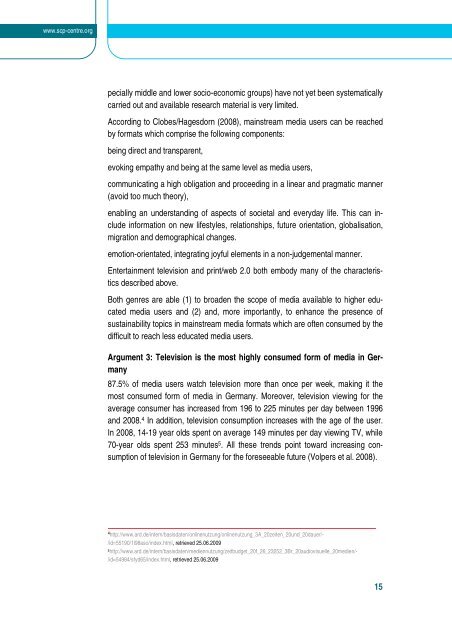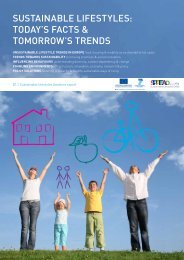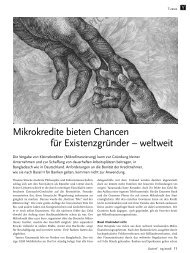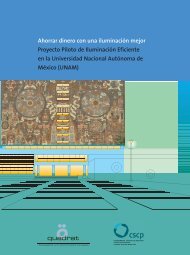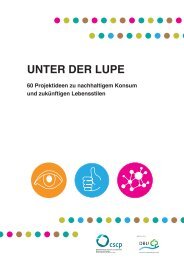integrating sustainability themes into media - Collaborating Centre ...
integrating sustainability themes into media - Collaborating Centre ...
integrating sustainability themes into media - Collaborating Centre ...
Create successful ePaper yourself
Turn your PDF publications into a flip-book with our unique Google optimized e-Paper software.
www.scp-centre.org<br />
pecially middle and lower socio-economic groups) have not yet been systematically<br />
carried out and available research material is very limited.<br />
According to Clobes/Hagesdorn (2008), mainstream <strong>media</strong> users can be reached<br />
by formats which comprise the following components:<br />
being direct and transparent,<br />
evoking empathy and being at the same level as <strong>media</strong> users,<br />
communicating a high obligation and proceeding in a linear and pragmatic manner<br />
(avoid too much theory),<br />
enabling an understanding of aspects of societal and everyday life. This can include<br />
information on new lifestyles, relationships, future orientation, globalisation,<br />
migration and demographical changes.<br />
emotion-orientated, <strong>integrating</strong> joyful elements in a non-judgemental manner.<br />
Entertainment television and print/web 2.0 both embody many of the characteristics<br />
described above.<br />
Both genres are able (1) to broaden the scope of <strong>media</strong> available to higher educated<br />
<strong>media</strong> users and (2) and, more importantly, to enhance the presence of<br />
<strong>sustainability</strong> topics in mainstream <strong>media</strong> formats which are often consumed by the<br />
difficult to reach less educated <strong>media</strong> users.<br />
Argument 3: Television is the most highly consumed form of <strong>media</strong> in Germany<br />
87.5% of <strong>media</strong> users watch television more than once per week, making it the<br />
most consumed form of <strong>media</strong> in Germany. Moreover, television viewing for the<br />
average consumer has increased from 196 to 225 minutes per day between 1996<br />
and 2008. 4 In addition, television consumption increases with the age of the user.<br />
In 2008, 14-19 year olds spent on average 149 minutes per day viewing TV, while<br />
70-year olds spent 253 minutes5 . All these trends point toward increasing consumption<br />
of television in Germany for the foreseeable future (Volpers et al. 2008).<br />
4http://www.ard.de/intern/basisdaten/onlinenutzung/onlinenutzung_3A_20zeiten_20und_20dauer/- /id=55190/1l98aso/index.html, retrieved 25.06.2009<br />
5http://www.ard.de/intern/basisdaten/mediennutzung/zeitbudget_20f_26_23252_3Br_20audiovisuelle_20medien/-<br />
/id=54984/sfyd65/index.html, retrieved 25.06.2009<br />
15


